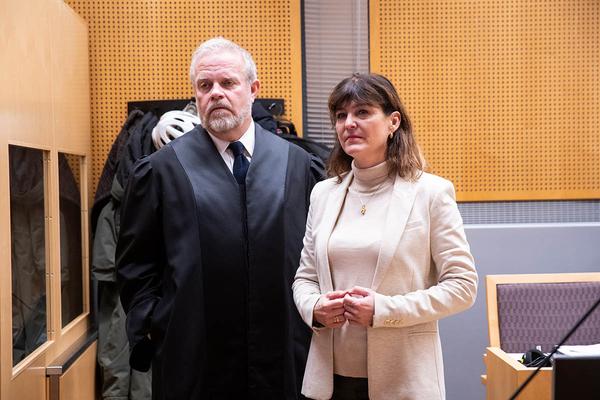20. august 2023
Blasphemy Taken to the Extreme

Ironically, one of satire's leading figures, the editor of Charlie Hebdo, is in Norway right now, just as we're discussing blasphemy again.
Av KJERSTI LØKEN STAVRUM, CEO Tinius Trust
Surrounded by security guards, Gérard Biard took to the podium at the cinema during Arendalsuka this Thursday. Biard survived the attack on the offices of the French satirical magazine Charlie Hebdo in January 2015 because he was in London. Twelve of his colleagues were shot and killed.
Now, Biard must be guarded 24/7 because some believe he hasn't shown sufficient respect to Islam.
Biard's message, in Arendal too, is about criticism of religion or blasphemy – that emotional tipping point where public opinion splits between indifference, critique, revulsion, and rage, often influenced by one's general attitude towards religion and particularly Islam. Some call for punishment for such expressions. Others threaten with terror.
Following the massacre at Charlie Hebdo, it took only a month in our country before it was proposed to remove the blasphemy clause from the criminal code immediately. It had been lingering for many years, even after it was formally repealed.
Resoluteness
In the book "Rabalder - Controversial Expressions Through 100 Years," Trygve Aas-Olsen and I discuss the decisiveness shown by politicians back then. Members of Parliament Anders B. Werp from the Conservative Party and Jan Arild Ellingsen from the Progress Party collaborated on the proposal, justifying it as follows:
"The attack on the French satirical magazine Charlie Hebdo in January 2015 was a direct assault on both freedom of expression and press freedom. While the existence of the blasphemy clause certainly doesn't legitimize violence, this clause, in the proponents' view, supports the notion that religious expressions and symbols are entitled to special protection against statements. This sends unfortunate signals, and it's time for society to firmly stand up for freedom of expression, even in religious matters."
The Justice Committee, led by Hadia Tajik from the Labour Party as chair and rapporteur, unanimously supported the proposal. The Parliament was equally unanimous. Even the Christian Democratic Party backed the proposal to remove the clause.
During the debate at that time, the party's representative, Kjell Ingolf Ropstad, explained his position:
"As a believer, it can often be tempting to defend one's god, as it can indeed be offensive to witness the denigration or mockery of what one considers sacred. Therefore, the Christian Democratic Party has previously been concerned with this protection, even though it has been dormant in the current criminal code. But as a believer, I am also very aware that my god does not need protection. Others and I must respect that there are different views on religion; hence, it is possible to criticize what I believe in. It is an important part of freedom of expression to be able to criticize religions, and it is not necessarily negative for religions to be challenged; quite the contrary. It is important to criticize actions done in the name of religions, appalling things like the death penalty for homosexuals, or to address issues like equality, and so on."
External Threats
The debate over blasphemy has flared up again, ignited by reactions and threats from outside, following the conspicuous Quran burnings in Nordic countries in the wake of their NATO applications.
Burning the Quran is a critique of religion, specifically Islam. The act is easily disliked and should not be exempt from criticism, but it is wrong to punish. I read that author Carsten Jensen believes those who burn the Quran are the heirs of Nazis. The kinship is no greater between them than those who burn paper with text. The purpose of the Nazi book burnings was different; it was an expression of intolerance and censorship, aiming to make the books inaccessible.
Freedom of speech is a civilizing principle to ensure that disagreements are handled with words, not violence. Our blasphemy clause, then dormant, was invoked, for example, by Muslim associations and congregations when they sued, among others, William Nygaard, the publishing director of Aschehoug, for publishing Salman Rushdie's book "The Satanic Verses." The lawsuit was later withdrawn.
Later, in 1993, Nygaard was shot and seriously injured as a result of that publication.
The Power of Definition
The first Commission on Freedom of Speech argued in 1999 for removing the blasphemy clause but feared it would be challenging and that the power of definition would be granted to "the party feeling insulted by the blasphemy."
When embassies are again threatened with bombings and attacks, and the terror alert is raised because those who burn the Quran are not prosecuted, it can be challenging to have a rational debate. However, it's even more crucial to adhere to principles over pragmatism. For the sake of the Norwegian debate, it's essential that Foreign Minister Anniken Huitfeldt made it clear that the matter was resolved from the authorities' perspective.
In 1933, author Arnulf Øverland was the last person prosecuted in Norway for "mocking someone's creed." The outspoken Øverland thought he was incredibly fortunate when he faced what he considered a heresy trial. In his lecture "Christianity – the Tenth Plague of Egypt," Øverland criticized what he called "this loathsome cannibalistic magic" where one must "eat God's body and drink his blood." The tradition continues, but Øverland was acquitted.
__
This Op-Ed was first published in Dagens Næringsliv on Saturday, August 19, 2023.



